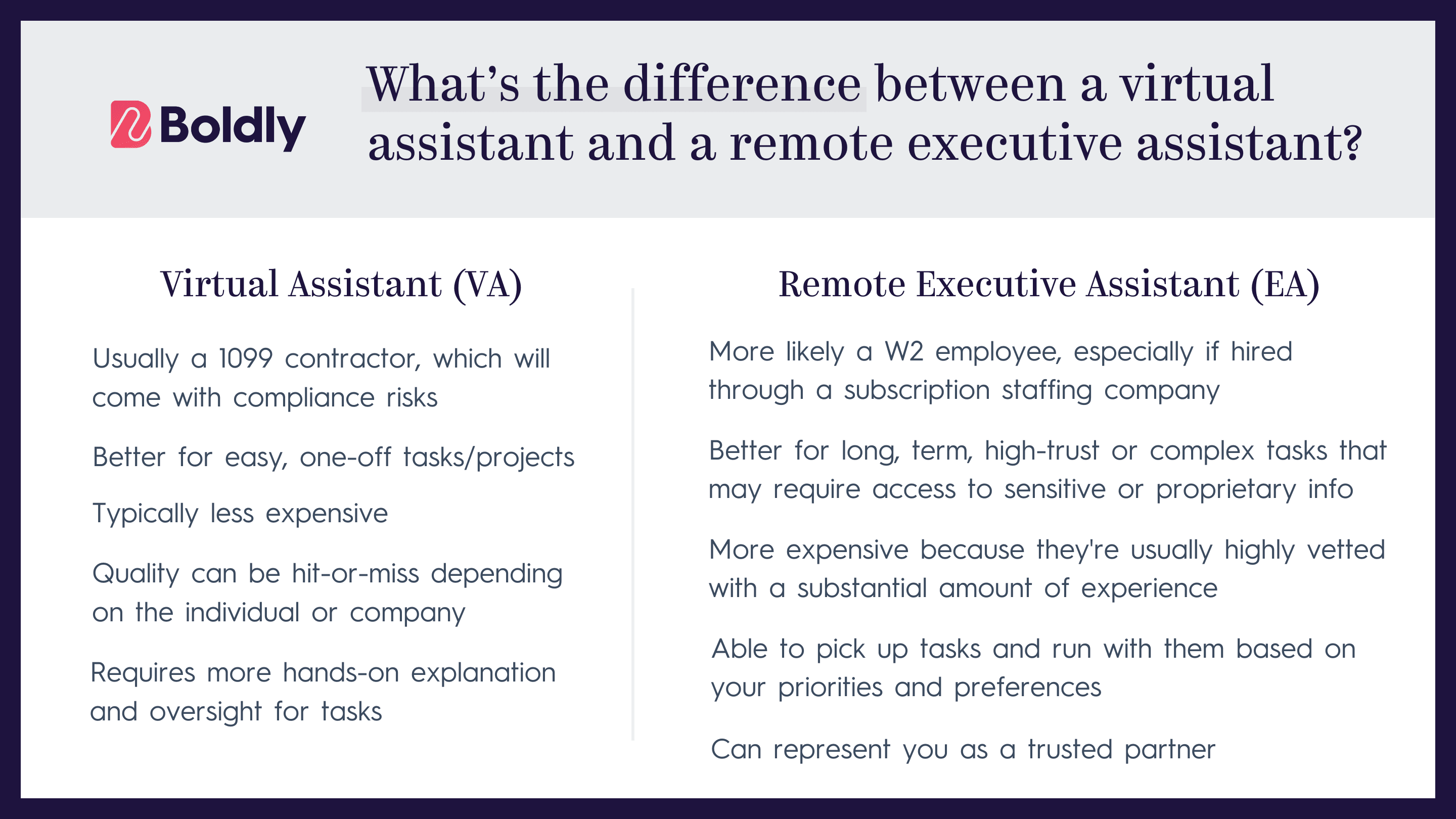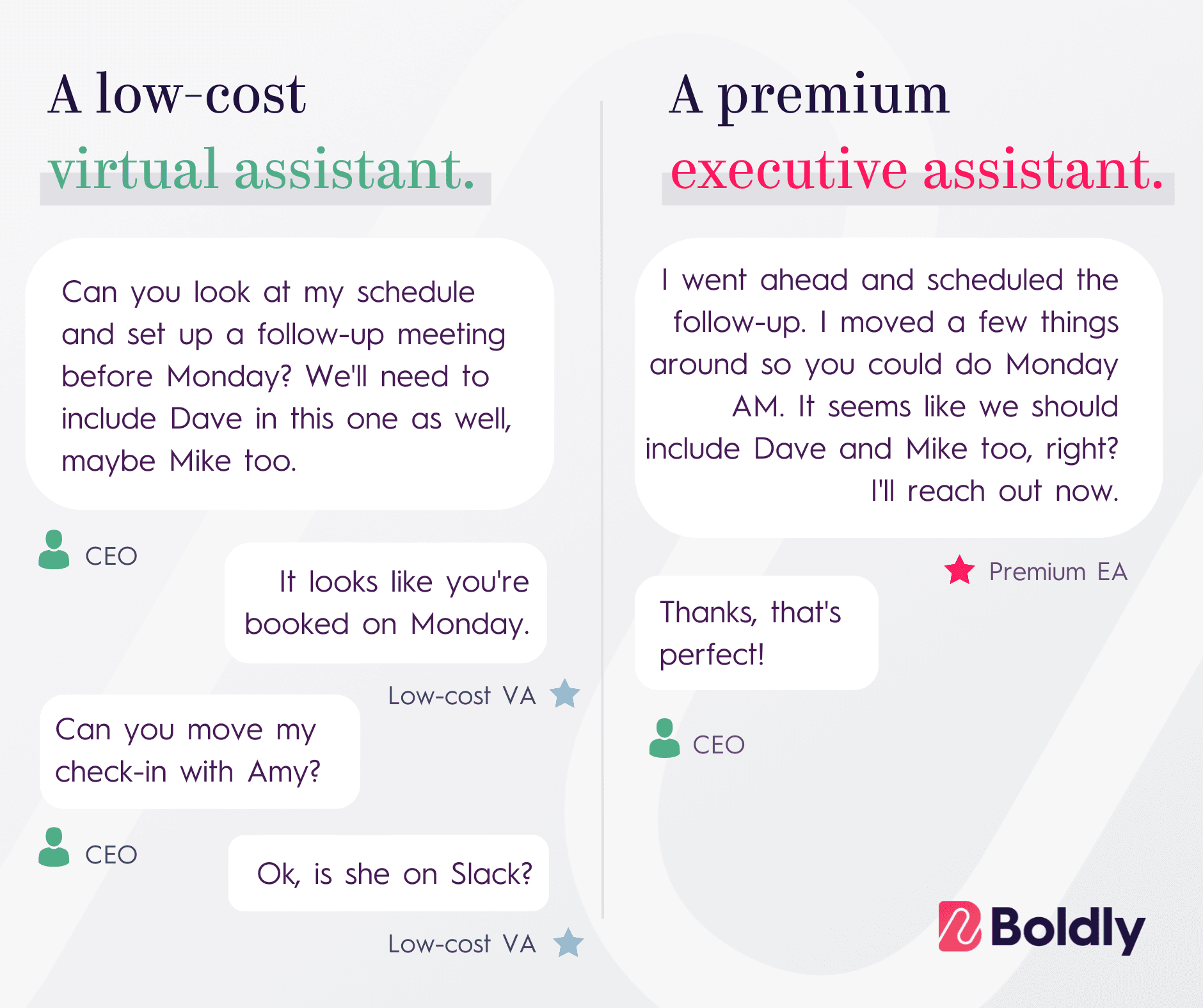Not all remote assistants are created equal.
They may all work virtually and help with different kinds of tasks, but those similarities don’t make them interchangeable. The difference comes down to the complexity of tasks they can handle, the trust you can place in them, and cost.
As we’ll show you, choosing between one or the other is a strategic decision that’s about more than freeing up time or making your work life more bearable. Several factors will determine which type of remote assistant is right for you.
Let’s break it down.
Virtual Assistant vs. Executive Assistant: Understanding The Difference
A virtual assistant (also sometimes simply called a remote assistant) typically provides low-cost solutions to easy, one-off tasks or projects.
A remote executive assistant will effectively manage your schedule, inbox, and other complex or sensitive tasks, all while proactively looking for ways to add value and enhance your efficiency. This is usually an experienced professional who can partner with you for the long term.


The difference between a virtual assistant and a remote executive assistant can get confusing because:
- There is admittedly a lot of overlap
- Some virtual assistants are doing remote EA roles (and vice versa)
- You’ll see titles ranging from remote assistant to administrative assistant to virtual executive assistant — and everything in between!
Things start to get even more confusing when you add in the fact that AI tools are now being called virtual assistants as well!
Here’s everything you’ll need to know:
- Why hire an administrative assistant for your team?
- What two factors are most important for an assistant?
- Virtual assistant or remote executive assistant – which is best for businesses?
- How to choose between a virtual assistant and remote executive assistant
- How to find the right assistant for you
We’ll dive deeper into the details of the two in a bit, but choosing to hire either a remote assistant or a virtual executive assistant is a significant decision because of their distinct roles and expertise.
Why Administrative Assistants Have The Potential To Energize Your Team
Maybe the thought of finding, training, and delegating work to an administrative assistant sounds like a hassle — and one that won’t benefit your team enough to be bothered with it. Or maybe you’re simply indifferent to the idea.
But a recent study by The Alternative Board might surprise you: the average entrepreneur spends 68.1% of their time working in their businesses on daily tasks and only 31.9% of their time working on their business.
A skilled administrative assistant can easily increase your productivity by 15–20%. Whether you decide to hire virtual administrative assistant support or bring someone on full-time, the key is finding someone who can take those time-consuming tasks off your plate so you can focus on what truly moves the needle in your business.
In other words, you’re likely pouring most of your energy into admin tasks like answering emails or scheduling appointments instead of setting long-term goals and strategic planning. That’s not to say that administrative tasks aren’t important, but they’re keeping your business from growing. You become task-focused instead of growth-focused.
Most executives and busy professionals know they should be delegating most of their tasks. The trouble is, it can be a lot of work to figure out where to start and what kind of assistant to choose.
Your choice between a virtual assistant vs. an executive assistant often hinges on the complexity and nature of the tasks you need help with.
- Virtual assistants typically handle routine clerical tasks.
- High-caliber executive assistants are often involved in more strategic planning and confidential matters. They are excellent at taking initiative and anticipating needs.


And the ultimate kicker is actually knowing what hiring options are available for finding a great administrative assistant. They don’t know whether they should turn to an executive assistant service or hire a full-time employee.
The Two Key Factors In Choosing Assistants
Before you decide between a virtual assistant or a remote executive assistant, there’s a bigger decision to make. It has to do with your potential personal assistant’s experience level and employment status.
Experience Level
Remote work and the gig economy have exploded in popularity. That means thousands of people are opening their doors for business and declaring themselves some kind of professional assistant.
Whether they call themselves virtual assistants or remote executive assistants, the question for you is one of experience. Some may have extensive experience supporting C-level executives at Fortune 500 companies, and others might be fresh to the workforce and looking to get started.
The role of an executive assistant is a mix of complex tasks and personal tasks their executive needs. They might handle complex research, scheduling, travel arrangements, and client communication. These are not skill sets you can pick up overnight.
When choosing an assistant, their experience level is a critical consideration.
Read more: How Much Experience Should Your Executive Assistant Have?
Employment Status
Backup assistants, personal assistants, virtual assistance—whatever you choose, how you structure their employment status is a huge concern.
Generally, remote assistants are either hired as independent contractors or brought on as employees (of either you or a staffing company). While the contractor path is attractive for short-term projects, it comes with compliance risks and less long-term reliability.
Since assistants often access your emails, schedule, and represent you to clients and colleagues, you’ll be investing significant trust in them. Employees, on the other hand, receive W2 benefits, eliminate compliance concerns, and tend to be more reliable partners for the long term.
Virtual Assistant vs. Remote Executive Assistant: Which Is Best For Businesses?
This decision often involves comparing an executive assistant vs admin assistant (or even a personal assistant vs executive assistant).
The key is to get clear on your specific needs, as each type of assistant brings a unique set of skills and expertise.
And because every company is unique, a virtual assistant or a remote executive assistant might work well for one, but not the other.
Let’s look at how these two are most frequently defined.
Virtual Assistants Defined
Virtual assistants are administrative professionals working virtually as independent 1099 contractors or provided through virtual assistant services. Some virtual assistants are doing this as their “side gig” while others make this their career. Some function more as personal assistants.
They’re typically a low-cost solution to completing easy, one-off administrative tasks. The rise of remote assistants has made it possible for businesses to access talent globally, expanding the pool of available skills and expertise.
Remote Executive Assistant Defined
A remote EA is different.
They can be hired in-house or brought on as part of a team from a remote executive assistant service or subscription staffing company. They ought to be a W2 employee. They are administrative professionals who are highly organized and skilled in responding to what the C-Suite demands. They focus on supporting management and senior executives with consistency.
Time management, project management, communication, email management, travel planning, and scheduling are just a few of the common executive assistant tasks they can perform, but they can do much more. They may work with one or several clients.
Choosing Between A Virtual Assistant Or Remote Executive Assistant
You can see the subtle differences between a virtual assistant and a remote executive assistant. So how do you go about deciding which is right for you? Does it matter all that much?
We think it matters quite a bit.
The support you get from one is very different from the other. To make it easy, we have five questions to help you decide.
1. Do you need a dedicated assistant for consistent communication?
A dedicated assistant works with you long-term and learns your preferences and communication style. A pool of assistants means starting from scratch each time you assign a task, requiring detailed explanations and resulting in inconsistent quality.
Most remote executive assistants are dedicated to one or a few clients at a time. They understand expectations, adapt to your style, and handle complex tasks independently.
If your tasks require insider knowledge about your business, a personal touch, or knowledge about your preferences, a dedicated solution is your best bet.
2. Are you comfortable if they manage (and therefore read) your email?
Consider the complexity and sensitivity of your work. Administrative tasks often involve proprietary information, client details, or access to personal data like credit card information for ordering supplies or booking travel.
Tasks that seem simple—like social media management—can significantly impact your company’s reputation. Complex tasks require a deep understanding of you, your personality, your goals, and your clients.
Here’s a general rule of thumb: if you’re uncomfortable having your assistant in your emails and personal information, you need a dedicated assistant you can trust.
3. What task turnaround time and working hours do you expect?
Virtual assistant services that don’t offer dedicated assistants often have longer turnaround times for getting your tasks done. Many don’t require their virtual assistants to respond immediately, and they might not even have working hours that match yours.
Because remote executive assistants are a dedicated solution instead of a pool solution, turnaround is much faster.
While even your dedicated remote executive assistant can’t promise 24/7 availability, most set a standard schedule with their clients as to when they’re going to be online. They are dedicated to your specific needs and can give you near-immediate responses during those time windows.
4. What’s your budget?
Using a shared virtual assistant, or working with a virtual assistant service that offers a pool to work from, is likely cheaper than a dedicated remote executive assistant.
Other things affect pricing as well, such as their experience level, how much access you get, promised turnaround time, or whether they’re located in the United States or elsewhere. If you’re working with a 1099 contractor, their hourly rate will vary.
Keep in mind that not every virtual assistant service vets their employees at the same level—meaning experience and skill sets vary wildly—and this is also reflected in pricing.
On the other hand, here’s how much an executive assistant costs and how to calculate the ROI of this admin investment.
Boldly’s executive assistants have an average of 10+ years of experience and many have worked for Fortune 500 companies. Because of that, companies like us will have a higher hourly rate. However, because you’re working with a dedicated fractional executive assistant, it’s still going to be a more cost-effective option than hiring someone of the same caliber in-house.
5. Do you need an assistant for short-term projects or long-term support?
The final question to ask yourself is how long you’ll need your assistant.
If you need short-term or project-by-project support, you can choose from a variety of different gig-type options for virtual assistants (e.g. Upwork).
If you’re looking at long-term support though, a dedicated remote executive assistant is what you need.
Pro Tip: When you work with an experienced EA, they can often function as an “executive administrator vs an executive assistant.” For you, this means they can operate with intimate knowledge of your business and look at situations through a leadership, or managerial, lens.
And because you’re looking long-term, you need to be sure the virtual assistant service you get your assistant from is retaining them long-term.
In other words, find a company that has a reputation for taking great care of their people. They should employ them as W2 employees with competitive pay and benefits, and be dedicated to retaining great people. Glassdoor is a good place to start that research, as are client testimonials.
Where To Find A Great Virtual Assistant
At this point, you probably know what kind of assistant will meet your needs — now where can you find the best virtual assistants?
If you’re looking for a quick overview, here’s our list of the best US-based virtual assistant companies and some tips for choosing the best virtual assistant.
Another great place to start looking is virtualassistantassistant.com. It’s a site that has real reviews from clients on a wide range of virtual assistant companies, including cost comparisons and descriptions of the strengths and weaknesses of the most popular VA companies.
Where To Find A Great Remote Executive Assistant
If a more permanent, high-quality solution is what you want, you’ll be looking for a dedicated remote executive assistant. Here’s our list of the best remote executive assistant companies.
When you outsource an executive assistant through a premium subscription staffing provider, you gain access to highly experienced professionals without the overhead costs and time investment of traditional hiring.
You can either begin by posting the job and recruiting/hiring your remote EA in-house, searching through remote staffing agencies, or you can check out subscription staffing from Boldly. No matter what route you choose, you’ll want to make sure to find an executive assistant you can trust.
Boldly is a unique solution to hiring quality remote talent that lets business owners and executives subscribe to incredibly talented assistants for one simple monthly payment. They can get access to Fortune-500 trained talent for key roles for the long term.
This actually solves three problems when looking for a dedicated remote executive assistant:
- You won’t need to recruit and hire on your own. On average, it costs over $4,700 to recruit and almost $3,000 to train a new in-house employee. That’s before paying any salary.
- Your assistant will be around for the long term. Our team members have flexible, stable, W2 employment with benefits, and a company focused on their happiness and retaining them for the long term — and more than double the industry average.
- Your assistant is of the highest quality. You’ll get to work with someone who has been thoroughly vetted and has more than 10+ years of professional experience as an executive assistant.
Premium subscription staffing is getting popular precisely because more leaders demand these advantages: the flexibility to scale quickly at a lower cost, and without the hassles of recruiting and hiring.
More Frequently Asked Questions
Can an executive assistant work remotely?
Absolutely! In fact, the executive assistant role can be a great fit for a remote or hybrid schedule. Studies show that remote executive assistants often match or exceed the productivity of their in-office counterparts, with one Stanford study finding that remote workers are 13% more productive. With strong communication skills and the right technology, experienced executive assistants can handle scheduling, inbox management, travel coordination, and other administrative duties without needing to be physically present in the office.
What are the main differences between a virtual assistant and an executive assistant?
It’s all about complexity and strategic value. Virtual assistants typically handle routine, task-based support like scheduling and data entry. In contrast, executive assistants offer more comprehensive, strategic support—including decision-making assistance, complex project management, and proactive problem-solving.
What roles or titles are higher than an executive assistant?
In many organizational structures, roles like Chief of Staff, Chief of Operations (COO), and/or Operations Manager might have broader strategic responsibilities that extend beyond an executive assistant’s typical scope. Here’s what you need to know about the differences between an executive assistant and a Chief of Staff.
Although they may share the same title, executive assistants who support higher-level executives may “outrank” EAs supporting lower-level managers or directors. You’ll sometimes see these called Executive Assistant to the CEO, Senior Executive Assistant, Chief Executive Assistant, or C-Level executive assistants.
What is a C-level executive assistant?
These are highly specialized professionals supporting top-tier executives like CEOs and CFOs. They handle extremely sensitive information, contribute to strategic decision-making, and often serve as a critical bridge between executive leadership and the broader organization.
What is another name for a virtual assistant?
Virtual assistant terminology can vary, but one particularly confusing development is that AI tools are now also being called “virtual assistants” or “AI virtual assistants,” which is entirely different from the human administrative professionals we’re discussing here.
What is another title for executive assistant?
Other titles for executive assistant could be executive coordinator, personal assistant, personal executive assistant, or even “assistant to the [executive title]”. We’ve even seen “executive business partner” and “business support specialist”. While these titles may seem nuanced, there are many overlapping priorities and skillsets, which makes things even more confusing!
What skills are important for a remote executive assistant?
The most critical skills blend technical proficiency with strategic thinking. Exceptional communication, razor-sharp organizational abilities, and proactive problem-solving are all part of the day-to-day.
Specifically, top-performing remote executive assistants typically demonstrate knowledge of collaboration tools (Slack, Microsoft Teams, Zoom), project management platforms (Asana, Monday.com, Trello), calendar systems (Google Calendar, Outlook), and often have expertise in CRM platforms, expense management, and basic data analysis.
Whichever Solution You Decide On…
If you’re sold on virtual assistance, meaning you’re ready to outsource your administrative duties to a remote assistant, you’re taking a step in the right direction.
Whether you opt for a virtual executive assistant, a traditional in-office executive assistant, or a hybrid role like an executive assistant personal assistant, the key is to find a solution that aligns with your specific needs and working style.
The world of remote work has opened up new possibilities, allowing businesses to access top-tier talent regardless of geographical limitations. By carefully considering your requirements and the unique advantages offered by different types of assistants, you can find the perfect support to help drive your business forward and free up your time to focus on strategic growth.
Handing off these tasks is the best way to regain your time and focus on growth and the future of your business while knowing day-to-day operations aren’t suffering.
How you do that, and which choice you make, depends on careful consideration. If you’re interested in learning more about subscribing to your next remote executive assistant, get in touch here.




